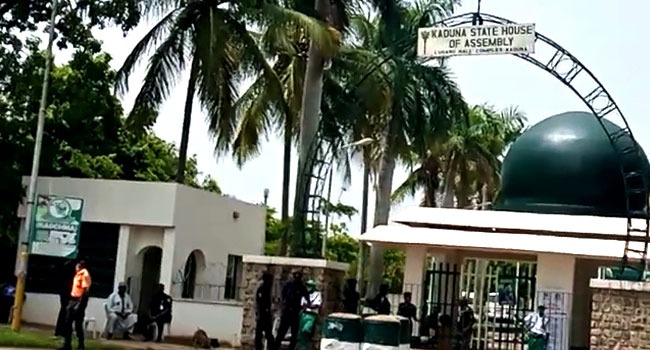The Kaduna State Ministry of Environment and Natural Resources and the House of Assembly on Tuesday apologised to the public for felling some historical trees in the assembly’s complex.
The News Agency of Nigeria (NAN), reports that during a technical review meeting on the draft climate change policy document for Kaduna State, the ministry and the assembly received knocks from stakeholders over their actions.
The House of Assembly is historically known for giant trees surrounding it and within the complex, but the trees were spotted to have been felled.
NAN learnt that each of the giant trees had files containing its botanical type, the planter and the nurtures.
The uproar by environment enthusiasts, arising from the trees’ felling, had generated disappointments after several advocacy visits and campaigns to the house on the need for commitment and laws to protect the environment.
The Chairman of the Assembly’s Committee on Environment and Natural Resources, Mr Usman Stingo, said they felled some of the trees for some cogent reasons.
He, however, expressed regrets over the action, saying they would replace the trees in double and nuture them to full growth.
Stingo said the major factor affecting the environment was human activities.
He, therefore, called for review of the draft climate policy document and assured of the assembly’s readiness for speedy passage of the bill at its floor.
Also, the state’s Comissioner for Environment and Natural Resources, Mr Abubakar Buba, said they gave permission for pruning of the trees within the assembly’s complex.
“I was shocked when I heard they cut down the trees,” he said.
Buba, represented by Mrs Linda Yakubu, the ministry’s Permanent Secretary, said in 2024, it planned to plant a minimum of 20,000 trees across the state, to mitigate the effects of climate change.
He stressed that the ministry was keen in ensuring the safeguarding of the forests.
“For every tree that will be felled in Kaduna, there must be approval and inspection to ascertain the need to fell the tree.
“If the needs are genuine, when it is approved, it must be replaced with planting of at least two,” he said.
According to Buba, most of the charcoal seen being transported within the state were brought from neighboring states.
He expressed optimism that the draft policy document, if completed, would go a long way to safeguard the environment, to further mitigate the effects of climate change.
Earlier addressing newsmen at the sideline of the engagement, Prof. Yahaya Ibrahim, a Consultant at Presting Green Environmental Safety, said when the British came to Kaduna, they mapped out the assembly’s location at the independence way to be a centre of the metropolis.
He explained that close to the complex was the stadium where durbah was held and trees were needed for relaxation.
“Prominent people at that time were those who planted the trees, from Fredrick Lugard Hall to Ranchers Bees and Ahmadu Bello stadium.
“All the trees were named and filed in the state. This is why the trees are being taken care of.
When we saw some of the trees being felled, we were shocked and had to immediately call attention of the assembly’s Committee on Environment.”
On the review of the draft policy document, Ibrahim said it would guide the environment ministry on climate change related issues and activities.
He said areas in the draft policy document which were observed not to have been included were those in children protection under climate change, which they added.
Ibrahim said the overall objective was to achieve a climate resilience, adaptation and mitigation in Kaduna State so that the people would not be vulnerable.
He mentioned some of the vulnerabilities that needed to be avoided to include reduction in agricultural yield, reduction in flowing rivers, among others.
NAN reports that the engagement, supported by Safe the Children International (SCI) and Open Government Youth Innovation Hub, was attenxed by children from various schools in Kaduna and other stakeholders from MDAs.









